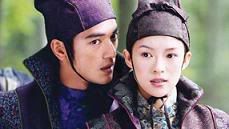How’s House Of Flying Daggers?

Went to Megamall to watch The Bourne Supremacy but when I saw there was a sneak preview of director Zhang Yimou’s House Of Flying Daggers I watched that instead. After the movie it I received an SMS message from Daniel/a: “Which is better, that or Hero?” I must admit it’s a tough call.
Like Hero, Daggers deals with themes of passionate love hidden under calm surfaces, individual needs versus society’s greater good, loyalty versus deception, unrequited love and the devastating repercussion of jealousy; all that in between gorgeously choreographed fight scenes in picture-perfect settings. It stars Asian megastars Andy Lau (who I found much cuter in his younger days), Takeshi Kaneshiro (gorgeous and charming), and the mandatory Zhang Ziyi (it seems every important Chinese film these days must have her in its cast otherwise it cannot be called, quote-unquote, “an important Chinese film.”)
While the backdrop of this film is political (the dynasty running after a rebel group called “House of Flying Daggers”), it is really a romance movie at heart. The scope is smaller compared to Hero, focusing on three main characters. But like the Jet Li film, this one has layers upon layers of deception. Two police captains (Lau and Kaneshiro) suspect that a blind courtesan/dancer (Ziyi) in a brothel is really a member of the “House of Flying Daggers.” They concoct a plan to flush out the group by arresting Ziyi and then having Kaneshiro rescue her from jail. He’s sure that his charm will suffice to carry out the plan. But as the movie progresses, one wonders who’s fooling who, who’s really blind from the truth?
Many of the visual treats in Hero are also present here: flying daggers, slow-mo action movements, colorful textile fluttering in the wind. I think Zhang Yimou is really bent on engaging Ang Lee on a match of one-upmanship: Daggers even has the fight-in-the-bamboo-forest sequence. But instead of Zhang Ziyi taking on one Chow Yung Fat, she takes on a whole army.

Show-stopping set pieces include: a dance-game sequence that showcases Ziyi’s classical ballet training (it’s like the ancient Chinese precursor to Dance Dance Revolution); a fight sequence in the forest; another one in a golden field; the aforementioned fight in a bamboo forest; and a climactic fight scene which mimics the Ziyi-versus-Maggie Cheung scene in Hero: nature transforms to become an appropriate backdrop to the action at hand. But this time instead of autumn leaves turning blood red, it is snow that falls, at once pristine-white and innocent, yet cold as death (white also brings out the color red beautifully).

Also, Kaneshiro’s Jin can give Legolas a run for his money. When Jin, an expert archer, lets loose his arrows in the air, Yimou’s camera lovingly follows them as they strike their target. Living up to its title, the movie has a lot of flying daggers; the camera captures the grace and beauty of their flight.
The only very minor quibble I have against this film is that of the cinematography. While overall the movie is ravishing to look at, there were some shots that were slightly defocused.
I found Hero’s structure of repeating stories (color-coded to help the audience not get lost) more challenging, more interesting. Daggers is simpler and easier to follow. The former tackles more themes; the latter is more focused. The former is sprawling; the latter more intimate (but the settings are still spectacular—I never knew China looked that great!) The former is about politics and love; the latter is about the politics of love.
In the end, I think this is the more accessible movie of the two. The stakes are not as high as in Hero, but in Daggers unrequited love and jealousy can be as devastating as any political upheaval.


<< Home